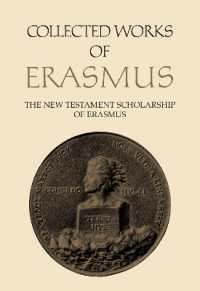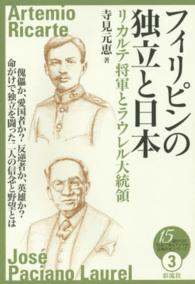- ホーム
- > 洋書
- > 英文書
- > Politics / International Relations
Full Description
Millions of enfranchised people live in abject poverty in democracies around the world. Yet in representative democracies, the success or failure of political parties rests on their ability to effectively engage voters. In today's highly unequal and individualized societies, the diversity of voters along socioeconomic, religious, and other lines presents an obstacle for parties vying for electoral success. How, then, can widespread, crushing poverty still exist in stable democracies, if every citizen has a vote? Two wildly different parties, Chile's right-wing UDI and Uruguay's left-wing Frente Amplio, have achieved stunning victories in this supposedly inhospitable political landscape. They have done so by simultaneously segmenting and strategically harmonizing their linkages to distinct cross-sections of voters in each society. While that electoral strategy makes for a winning hand for parties in fragmented modern societies, it perpetuates the gross inequalities that characterize the social, political, and economic landscapes of the developing democratic world. This book develops a new analytical and conceptual framework to unveil and explain segmented representation, revealing new implications for democratic societies.
Oxford Studies in Democratization is a series for scholars and students of comparative politics and related disciplines. Volumes concentrate on the comparative study of the democratization process that accompanied the decline and termination of the cold war. The geographical focus of the series is primarily Latin America, the Caribbean, Southern and Eastern Europe, and relevant experiences in Africa and Asia. The series editor is Laurence Whitehead, Official Fellow, Nuffield College, University of Oxford.
Contents
Introduction ; 1. Segmented Electoral Appeals: A Descriptive Framework ; 2. Patterns of Party-Voter Linkages in Chile and Uruguay: A Stylized Description of the Pre-1973 and Post-Transitional Periods ; 3. Socioeconomic Segmentation of Party-Voter Linkages in Post-transitional Chile and Uruguay ; 4. Territorial Segmentation of Party-Voter Linkages in Post-transitional Chile and Uruguay ; 5. Strategic Harmonization of Segmented Linkages: The UDI and Frente Amplio in Comparative Perspective ; 6. Causal Induction: Explaining Linkage Structures in Chile and Uruguay ; 7. Plausibility Tests: Out-of-Sample Cases ; 8. Conclusion ; Bibliography







